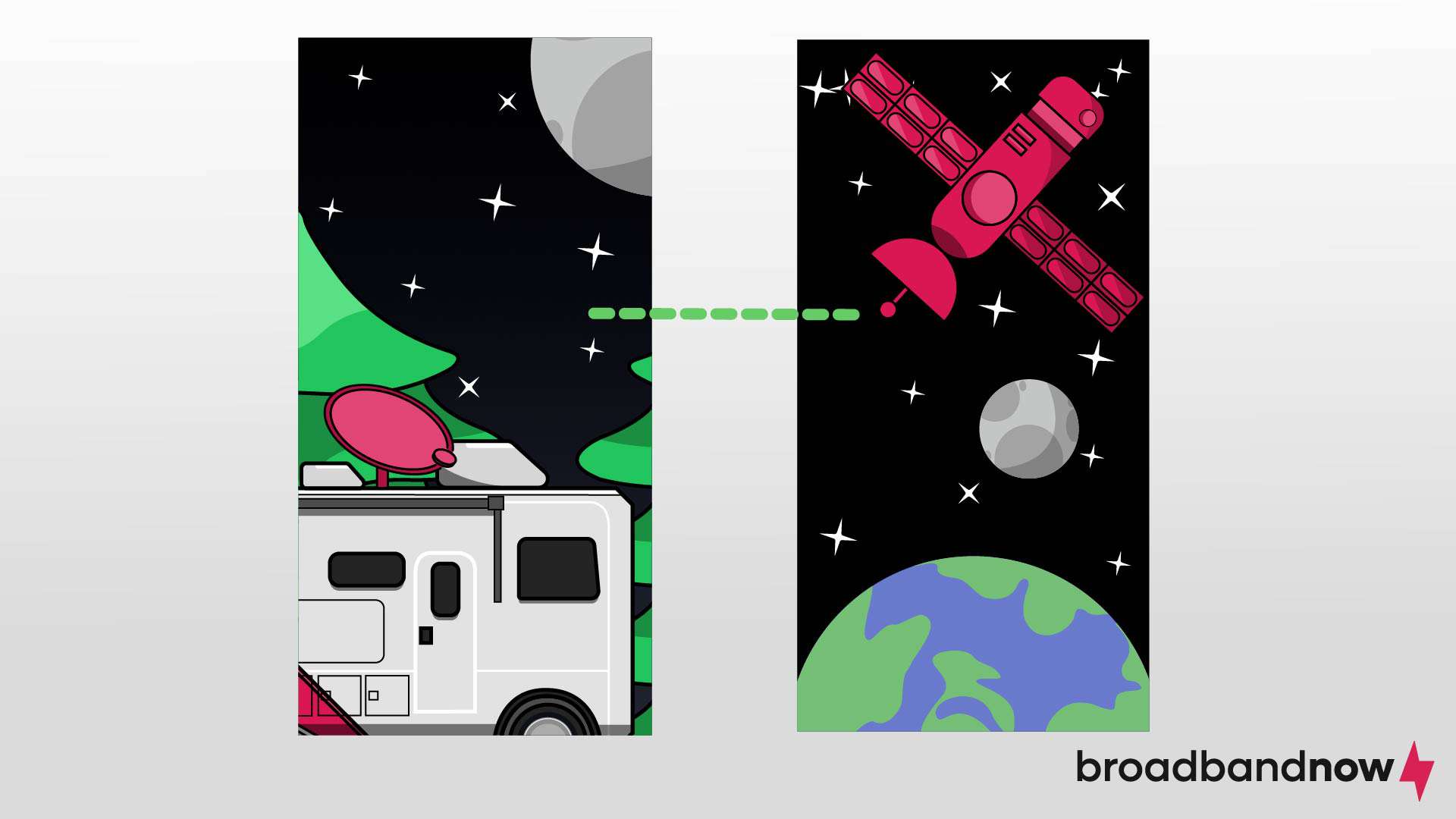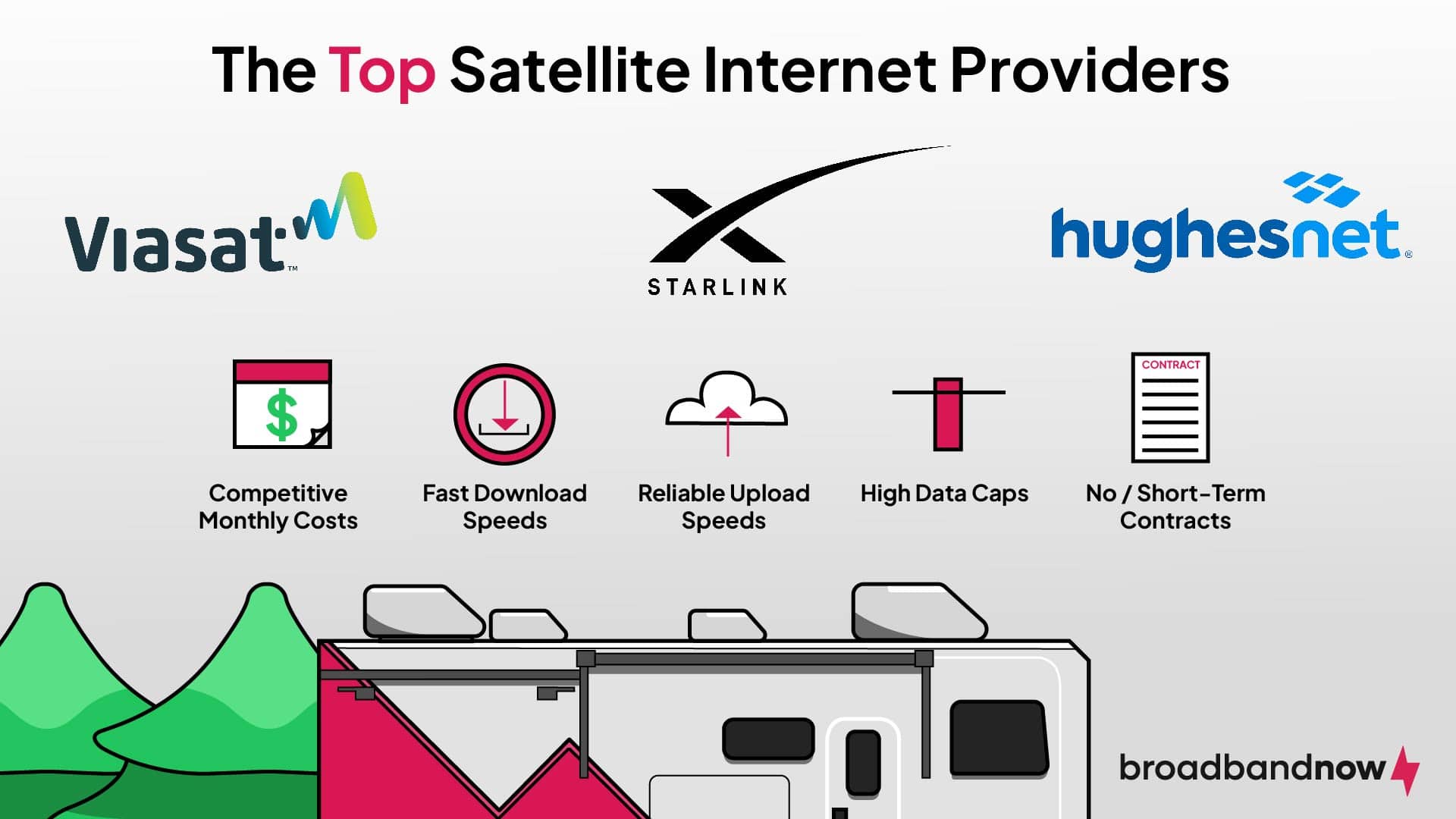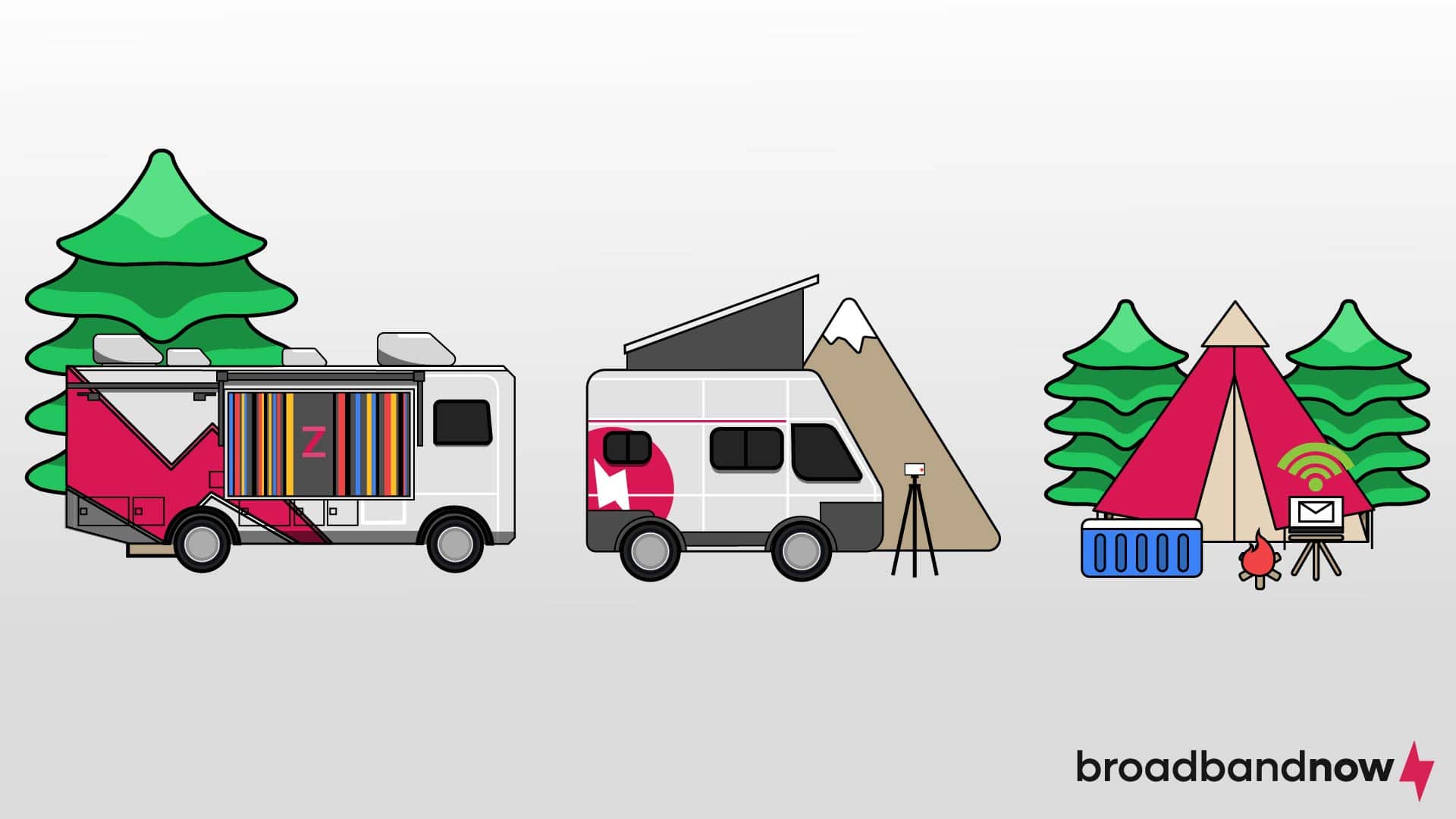Everything to Know About Satellite Internet for RVs and Vans
Satellite internet is an ideal way to stay connected while on the go, but it comes with some caveats.

If you’re a traveler and find yourself with spotty connectivity, satellite internet for RVs and vans may be exactly what you need. Thanks to satellite providers like Starlink, the technology behind satellite internet is quickly improving. Faster speeds and more forgiving data plans make satellite internet an increasingly appealing option, especially for folks on the go. Read on to learn how you can benefit from this type of internet connection while embracing your digital nomad lifestyle.
Satellite Internet for RVs and Vans
- What’s Satellite Internet?
- The Pros and Cons of Satellite Internet
- Required Equipment for Satellite Internet
- Satellite Internet Providers for RV Owners
- How Much Does Satellite Internet Cost?
- Is Satellite Internet Right for You?
- Alternatives to Satellite Internet
What’s Satellite Internet?

Satellite internet transmits data between a dish antenna and a satellite orbiting Earth. The satellite sends and receives signals to and from a network operations center on the ground that’s connected to the internet. The process involves a satellite modem at an installed location, which converts the satellite signals into internet data and vice versa. This technology enables you to access the internet from virtually anywhere, as long as you have a clear view of the sky.
Satellite internet is an excellent option for those living or traveling in RVs and vans because it provides reliable internet access regardless of location. Traditional wired internet services, such as cable or fiber, are often unavailable in remote or rural areas, which is where you’re likely to find yourself in your travels. Satellite internet bridges this gap to provide connectivity for work, communication, navigation, and entertainment. Recent advancements in satellite technology, particularly with low-Earth orbit (LEO) satellites, have improved typical connection speeds and latency compared with older satellite systems, making satellite internet a more viable and practical solution for mobile lifestyles.
The Pros and Cons of Satellite Internet
Understanding the pros and cons of satellite internet can help you decide whether this type of internet connection makes sense for your needs. Depending on your travel style, the drawbacks may outweigh the benefits of a reliable connection.
Pros
- Available in remote locations
- Independent of local infrastructure
- Portable and flexible
- Can provide reliable connectivity
Cons
- Higher latency compared to wired connections
- Weather can affect signal quality
- Generally higher cost
- Limited data plans with the potential for throttling
Required Equipment for Satellite Internet
A nomadic lifestyle often means downsizing your belongings and traveling light. You will need a small collection of equipment to access and use your satellite internet. In general, you’ll need to keep the following in your RV or van:
- Satellite Dish/Antennas: Receive signals from and transmit signals to the satellite. Portable satellite dishes or roof-mounted antennas are common for RVs and vans. Mounted dishes or tripod satellite dishes are common for remote satellite users.
- Mounting Equipment: Secures the satellite dish or antenna to your vehicle, ensuring stability and proper alignment with the satellite.
- Satellite Modem: Converts the satellite signal into internet data.
- Router: Distributes the internet connection wirelessly to multiple devices within your vehicle.
- Cables and Connectors: Connect the satellite dish/antenna to the modem and the modem to the power supply and router.
- Power Supply: Ensures that the satellite modem and dish/antenna have the necessary power, which might include inverters or portable power sources for off-grid use.
So, how does the equipment work to access your signal? If you’re using a mounted satellite dish, it folds down when moving and is usually controlled electronically from inside the cabin. Mounted satellite dishes vary in size, but if you’re traveling in a smaller vehicle, you may be limited in terms of how large a dish you can mount on the roof. Smaller satellite dishes cover a smaller area of the sky, which will impose limits on the internet quality you’re able to receive.
Smaller, manual satellite dishes are available regardless of vehicle size. These smaller dishes are usually on a tripod or other stand and can be moved around to get a better connection, but using a repositionable tripod dish does require more work and manual calibration. If you’re traveling to areas where you may encounter inclement weather or other environmental factors, a repositionable dish could be a better option for you.
If you have a residential satellite plan, your home is connected to a satellite receiver dish, usually mounted on your roof or a stand in an open area, with a clear view of the southern sky if it’s a very large dish. Your satellite internet is only available in your home and is not mobile. Satellite receivers work by scanning the sky for a satellite uplink to connect to. This is simple on a residential satellite plan since your location doesn’t change. When you’re traveling and using satellite internet for your RV or van, every time you deploy your satellite dish, your location coordinates need to be obtained for the dish to accurately and correctly scan the sky.
Satellite Internet Providers for RV Owners

The most popular satellite internet providers available are Starlink, Viasat, and HughesNet. Both Viasat and HughesNet offer flexible plans that suit the needs of RVs, vans, campers, and other mobile vehicles. Starlink has a dedicated plan for mobile users called Starlink Roam, specifically tailored to your needs as a digital nomad. Below is a comparison of the services offered by each internet service provider.
| Provider | Monthly cost | Download speeds (up to) | Upload speeds (up to) | Data caps | Contracts |
|---|---|---|---|---|---|
| Starlink | $50 to $165 | 400 Mbps | Often around 5 to 25 Mbps | Unlimited (subject to network management during peak times) | None |
| Viasat | $39.99 to $119.99 | 150 Mbps | 3 Mbps | Plans may range from roughly 40 GB of high-speed data to options marketed as unlimited, with speed throttling after a threshold | None |
| HughesNet | $39.99 to $94.99 | 100 Mbps | 3 Mbps | Common plan options provide around 100 to 200 GB of priority data per month | Often 24 months on standard plans |
How Much Does Satellite Internet Cost?
Depending on your satellite provider and internet plan, you’re generally looking at a monthly cost that often starts around $50–$70 and can exceed $150 for higher-speed or mobile-focused options. Unlike wired internet, such as cable and fiber, your plan options are usually more limited when choosing satellite internet. Equipment costs can get quite pricey but are often a one-time fee. For many popular services, you can expect standard hardware to cost several hundred dollars, though some providers let you lease the equipment for an additional monthly rate instead of paying everything upfront. Installation costs are another factor, and Starlink emphasizes that its service is designed for self-installation without a professional. Viasat and HughesNet, however, typically require professional installation, which can add an extra one-time fee.
In short, satellite internet isn’t the cheapest option when you consider all these fees. Due to larger equipment and complex installation, you’re unlikely to avoid these costs when selecting a satellite internet plan. Satellite internet providers also implement soft and hard data caps, which can cost you data overage fees if you go over the limit. Still, it might be worth the investment as most of these costs are one-time and upfront rather than extended over a long period of time.
Is Satellite Internet Right for You?

Assess your typical internet usage patterns, frequented locations, and the importance of constant connectivity to decide if satellite internet works for your needs. Consider how much data you consume, the types of online activities you engage in (such as streaming, browsing, or video conferencing) and whether you often find yourself in areas with poor or no cellular coverage. If reliable internet access is crucial for work, navigation, or staying connected, satellite internet might be a good fit.
As you search for the right provider, consider cost, data limits, speed, and latency. Compare different service providers to find plans that offer sufficient data at reasonable speeds and costs. It’s also essential to evaluate the setup and maintenance requirements of satellite equipment and the potential for weather-related disruptions. Seek out reviews and discuss options with fellow digital nomads to see what’s working for others in your position.
You’ll likely be weighing the use of satellite internet against other popular wireless internet options, such as fixed wireless or 5G internet. Satellite internet can be a better option due to its extensive coverage and independence from local infrastructure. While fixed wireless and 5G rely on proximity to cell towers and may be unavailable in remote or rural areas, satellite internet can provide connectivity anywhere with a clear view of the sky.
Alternatives to Satellite Internet in an RV
While satellite internet can be a reliable internet option, the cost is quite high and may be outside of your budget. Luckily, there are other options you can choose from if satellite internet isn’t right for you.
- Fixed Wireless: This type of wireless internet uses radio signals to deliver internet service from a local base station to a fixed antenna at your location. It can provide high-speed internet but requires a clear line of sight to the base station. This can be challenging in densely forested areas or hilly terrain, and its availability is typically limited to certain regions.
- 5G Internet: An attractive option for travelers who need high-performance internet, 5G internet is still improving but is mainly available in urban and suburban areas. 5G hotspots can be used to create a Wi-Fi network on the go, providing robust internet access wherever 5G signals are strong. However, be aware of potential data caps and the current limitations in 5G coverage in rural and remote areas.
- Cellular Data Plans: Data plans from mobile carriers, often paired with 4G LTE or 5G devices, can provide high-speed internet access wherever there is cellular coverage. Some carriers offer unlimited data plans, but it’s important to check for any throttling or data cap policies.
- Mobile Hotspots: A mobile hotspot device can create a Wi-Fi network using cellular data. These devices are portable and can connect multiple devices at once. They’re ideal if you need to share the connection among several gadgets.
- Public Wi-Fi: Many RV parks, campgrounds, cafes, and libraries offer free Wi-Fi. While this option is cost-effective, it often comes with security risks, slower speeds and unreliable connectivity. It’s suitable for occasional use but may not be reliable for work or continuous connectivity.
Frequently Asked Questions About Satellite Internet for RVs
Is satellite internet good for remote work?
Satellite internet provides reliable connectivity on the go, ensuring digital nomads can stay connected regardless of location. While it might not offer the same performance as fiber or cable internet, satellite internet is generally sufficient for tasks like email, browsing, and video conferencing, making it a practical solution for remote work from mobile living spaces.
Can I use Starlink for my RV?
Starlink, a satellite internet service by SpaceX, offers mobile-focused service options that can be used in RVs and vans. The service provides high-speed internet with wide coverage, even in many remote areas. It doesn’t rely on traditional ground-based infrastructure and can work wherever there is a clear view of the sky, subject to Starlink’s current coverage map and plan terms.
Can you stream TV with satellite internet in an RV?
You can stream TV with satellite internet in an RV, as this type of internet provides sufficient bandwidth for streaming services like Netflix, Hulu, or Max. Watching content in standard definition (SD) is likely the best option, as streaming in HD or 4K would take up too much bandwidth. Manage data usage carefully, choose a suitable satellite internet plan with ample data allowance, and stream during times of stable connectivity.
What is the fastest internet for an RV?
The fastest internet option for RVs typically depends on location and availability, but currently, a 5G internet option or satellite internet from Starlink Roam will provide the highest speeds for mobile connectivity. While Starlink tends to provide consistent connections for RVs and vans, 5G coverage is still expanding and may be limited to urban and suburban areas, with rural coverage growing gradually.
How can I get better internet in remote campgrounds?
Improving internet in remote campgrounds usually means combining options: a satellite setup like Starlink for wide coverage, plus a cellular hotspot that takes advantage of any nearby 4G or 5G signal. Placing equipment with a clear view of the sky, using external antennas or boosters for cellular, and downloading shows, maps and files in advance over strong connections can all help keep you online more reliably while traveling.
